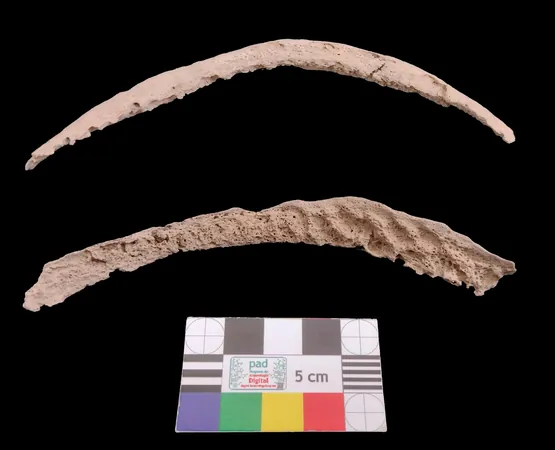
Shocking Discovery: Syphilis May Have Originated in the Americas!
2024-12-18
Author: Liam
Shocking Discovery: Syphilis May Have Originated in the Americas!
In the spring of 1495, Europe was gripped by a mysterious and deadly health crisis as an unknown illness swept through the continent. This disease, now believed to be syphilis, caused high mortality rates and left the survivors with life-altering effects. The outbreak coincided intriguingly with the return of Christopher Columbus and his crew from their momentous voyages to the Americas, raising eyebrows as historians and scientists pondered whether the disease stemmed from contact with the New World.
While many diseases traveled westward from Europe to the Americas—claiming countless indigenous lives—syphilis presents a unique case that appears to have made a reverse journey. This has given rise to the 'Columbian theory,' which posits that the sudden appearance of syphilis in Europe was tied to Columbus' expeditions. However, this theory is increasingly meeting skepticism.
Archaeological evidence indicates that skeletal remains from Medieval Europe exhibit lesions characteristic of syphilis long before Columbus set sail in 1492. This has led some researchers to argue that the history of syphilis in Europe may have begun much earlier and that the late 15th-century epidemic could have unrelated causes.
To shed light on the origins of syphilis, a groundbreaking study led by Kirsten Bos and Johannes Krause from the Max Planck Institute examined ancient DNA from archaeological bones in the Americas. Their work is crucial in tracing the history of this disease, as previous attempts at analyzing the pathogen's lineage have struggled to conclusively tie it to pre-Columbian or post-Columbian origins.
Using advanced techniques, the researchers successfully retrieved and analyzed five ancient genomes from Mexico, Peru, Chile, and Argentina, providing compelling evidence that syphilis and its relatives, such as yaws and bejel, existed in the Americas long before Columbus’ arrival. According to postdoctoral researcher Rodrigo Barquera, this finding reveals a rich diversity of syphilis-related pathogens once circulating in the continent.
The implications of this research are profound. The evidence points to syphilis having rooted itself in the Americas, with its introduction to Europe likely occurring at the end of the 15th century. The subsequent epidemic in Europe was possibly exacerbated by human trafficking and the broader European expansion across the Americas and Africa during the 16th century.
While the results bolster the American origin theory of syphilis, questions remain about the presence of syphilis-like lesions found in skeletal remains dated before 1492 in Europe. The continuing search for ancient forms of the disease and further studies on ancient DNA could ultimately redefine our understanding of how diseases have traveled and evolved across continents.
Could this revelation reshape our insight into historical pandemics? Only time, and further research, will tell! Stay tuned as the story unfolds.









 Brasil (PT)
Brasil (PT)
 Canada (EN)
Canada (EN)
 Chile (ES)
Chile (ES)
 España (ES)
España (ES)
 France (FR)
France (FR)
 Hong Kong (EN)
Hong Kong (EN)
 Italia (IT)
Italia (IT)
 日本 (JA)
日本 (JA)
 Magyarország (HU)
Magyarország (HU)
 Norge (NO)
Norge (NO)
 Polska (PL)
Polska (PL)
 Schweiz (DE)
Schweiz (DE)
 Singapore (EN)
Singapore (EN)
 Sverige (SV)
Sverige (SV)
 Suomi (FI)
Suomi (FI)
 Türkiye (TR)
Türkiye (TR)